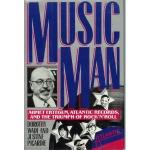|
This section contains 208 words (approx. 1 page at 300 words per page) |
Founded in 1947 by Herb Abrahamson and Ahmet Ertegun, Atlantic Records went on to become one of the most successful independent record companies in the history of music by challenging the economic dominance and musical hegemony of the major record labels in the 1950s. Ertegun and Abrahamson were music lovers who wanted to record the blues and gospel music that was ignored by the major labels. Their taste in rhythm and blues music just happened to coincide with the growing appetite for these records by white teenagers and their parents. Atlantic signed many rhythm and blues artists (such as Big Joe Turner) who made important contributions to what was later called rock 'n' roll.
In the 1960s Atlantic broadened its base in African American music, especially soul music, and made it accessible to the larger white mainstream audience. Its leading record producer—Jerry Wexler—moved many sessions to Muscle Shoals, Alabama where he produced a string of hits for singers such as Aretha Franklin and Wilson Pickett. In 1967 Warner Brothers took over the label.
Further Reading:
Gillett, Charlie. Making Tracks: The Story of Atlantic Records. London, Souvenir, 1988.
Wexler, Jerry, and David Ritz. Rhythm and the Blues: A Life in American Music. New York, St Martins, 1994.
|
This section contains 208 words (approx. 1 page at 300 words per page) |


